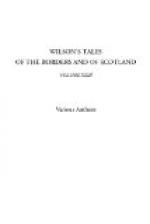On the other side, Mr. Andrews, counsel for Henrietta, maintained that while his learned brother assumed the one half of the case as proved, and repudiated the other as a lie or a myth, he had a right to embrace the other half, and pronounce the first a stratagem or trick. The proceedings in the back-room into which Jean Graham introduced Mrs. Hislop were more completely substantiated than those in the bedroom where Mrs. Napier lay; for while the one were sworn to by Mrs. Hislop herself, a soothfast witness, and confirmed in all points by the woman Graham, the other were attempted to be proven by the solitary testimony of the nurse Temple. The paper containing the curse was as indisputably in the handwriting of Mr. Napier as was the funeral letter. The money paid was proved by the fact that the orphan had been kept and educated for fifteen years. The name Henrietta was not likely to have been a mere coincidence, and it was still more unlikely that a respectable woman such as Mrs. Hislop would invent a story of affiliation so strangely in harmony with the secrets of the house in Meggat’s Land, and fortify it by a forged document. Then Mrs. Hislop was unable to write, and no attempt had been made on the other side to prove that Henrietta had a father other than he who was pointed out by the paper of the curse. So he (the counsel) might follow the example of his brother, and hold the other half of the case to be unexplainable by hypotheses, however ridiculous. The child having been disposed of to Mrs. Hislop,—a fact thus proved,—what was to prevent him (the counsel) from going also to the haunts of the tabernian Solons, or anywhere else in the regions of fancy, for the theory that Mr. Napier, or some plotter for him in the shape of Mrs. Kemp or John Cowie, substituted the dead child of a stranger for the living one of his wife, and bribed the nurse Temple to tell the tale she had told? to which she would be the more ready by the golden promptings of the woman Isabel Napier, the niece, whose brother would, in the event of the stratagem being concealed, succeed to the estate of Eastleys.
At the conclusion of these pleadings, the judges were inclined to be even more humorous than they had been previous to the issuing of the commission, for they had thought they saw their way to a judgment against the orphan. The president (Braxfield), it is said, indulged in a joke, to the effect that he had read somewhere—it was not for so religious a man to say where—of a child having been claimed by two mothers; he would like to see two fathers at that work, at least he would not be one; but here the claim was set up by Death on the one side, and Life (if a personification could be allowed) on the other, and they could not follow the old precedent, because he suspected none of their lordships would like to see the grim claimant at the bar to receive his half. And so they chuckled, as judges sometimes do, at their own jokes—generally very bad—altogether




